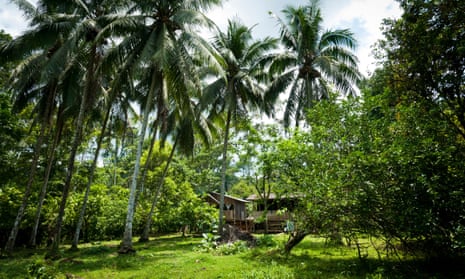An indigenous leader leading his people’s effort to reclaim ancestral land in Costa Rica has been wounded in a gun attack – the latest in a spate of targeted violence which has gone unpunished by authorities.
Mainor Ortiz Delgado, 29, a leader of the Bribri indigenous people in Salitre, Puntarenas province, was shot in the right leg earlier this month – the third time Ortiz has been shot allegedly by members of the same family in 14 months.
The suspected gunman, who carried out the gun attack in broad daylight in front of Delgado’s 13-year-old son, was detained but released within 24 hours.
Costa Rica, an eco-tourism hub with 5 million inhabitants, is Central America’s safest and most equitable country.
But in recent years, the Bribri people attempting to recoup lost land have been subject to dozens of violent attacks, racist harassment and trumped-up retaliatory lawsuits with almost total impunity.
As a result, the Inter-American Commission on Human Rights issued precautionary measures in 2015, calling on Costa Rican authorities to protect the lives and physical integrity of the Bribri and their indigenous neighbours, the Brörán people.
But the violence continued because the state failed to take action, according to Vanessa Jiménez, a lawyer with the not-for-profit organization Forest Peoples Programme who works with the indigenous communities.
This latest gun attack comes less than a year after 59-year-old Sergio Rojas Ortiz, an internationally acclaimed Bribri land and human rights defender, was shot dead at home in Salitre following years of death threats, harassment and assaults linked to his work.
At the time, the government acknowledged the growing violence against the country’s indigenous peoples involved in conflicts with mestizo families who have illegally occupied their ancestral lands, and pledged to deliver justice. Rojas Ortiz’s killers remain at large, and the land disputes remain unresolved.
“The state has relinquished its duty and has abandoned these indigenous people to seek justice in the court system which also fails them,” Jiménez told the Guardian. “The impunity has empowered those who want to do harm to the Bribri and Brörán.”
Latin America is the most dangerous continent in the world to defend land rights and natural resources, and indigenous and rural communities bear the brunt of the violence.
Costa Rica has eight indigenous ethnic groups totalling 105,00 people, according to the latest census, who represent approximately 2.4% of the total population. There are 24 legally recognised indigenous territories, which are exclusively for indigenous communities with historical ties to the land.
Families who settled on these lands before the 1977 Indigenous Act was enacted are considered “good faith’ illegal settlers who are entitled to compensation and relocation by the government. Those who occupied the land after the law was passed are considered “bad faith” settlers with no right to recourse.
But the law has never been implemented, and the land never returned.
Frustrated by the lack of progress, the Bribri in Salitre and the Brörán in neighbouring Térraba, have taken matters into their own hands, and retaken possession of some homes and land through non-violent occupations.
The response, on the other hand, has often been violent.
In 2013, Ortiz was attacked by 10 men who tortured him with a hot cattle branding iron, and shot him, lodging a bullet in his left thigh. He was also shot in 2019.
His mother, Mariana Delgado Morales, said: “They want to kill my son and the government has known of his precarious situation, but they do nothing effective and meaningful to protect him. I fear he will end up like Sergio [Rojas Ortiz].”
Last year, Magdalena Figueroa Morales, a Bribri elder, was seriously injured after a disgruntled neighbour threw liquid pesticide in her face. Shortly after, the elderly woman’s makeshift shack was burned down in a suspected arson attack. No one was arrested.
Despite the land recuperated, around half of the Bribri territory remains occupied by non-indigenous families and farmers.
